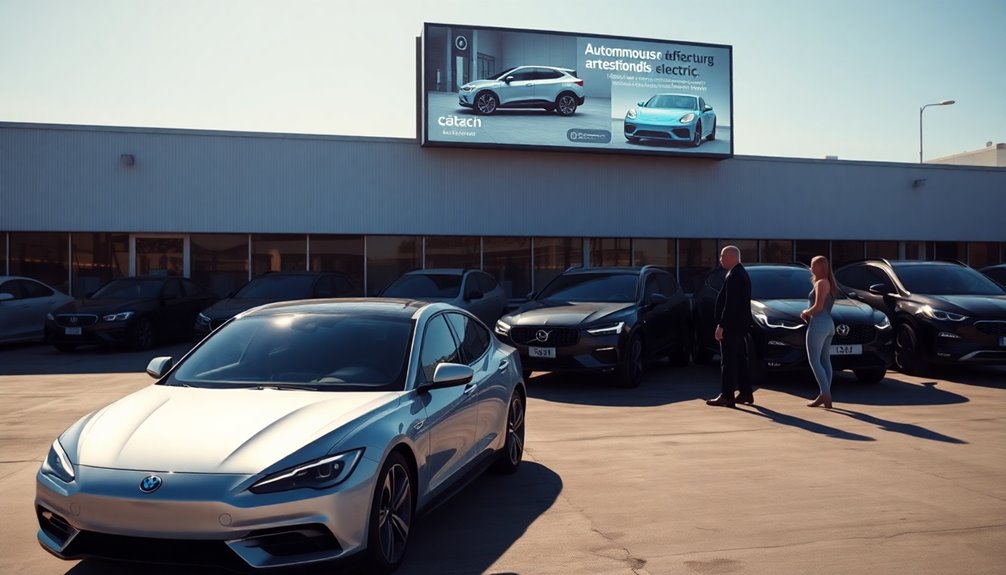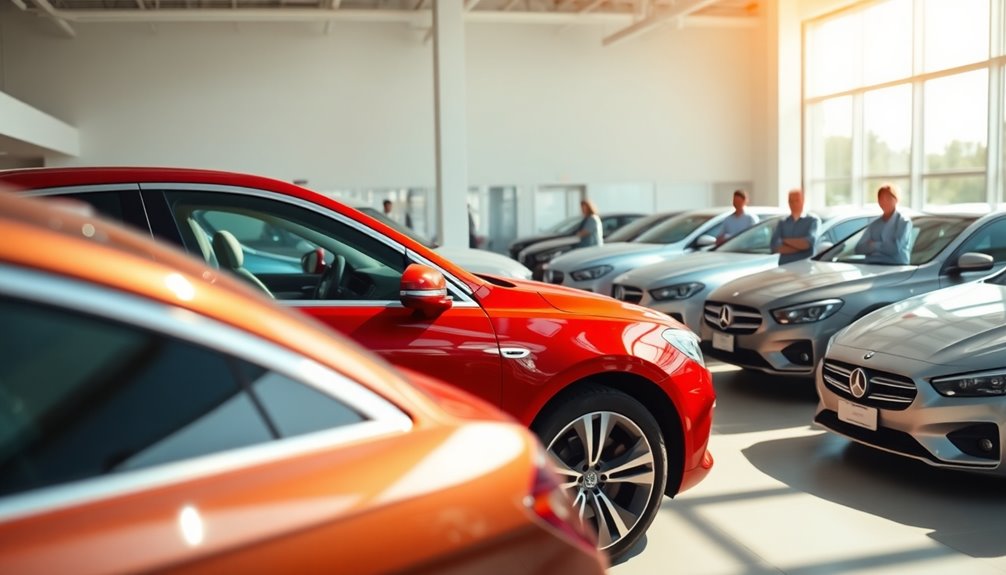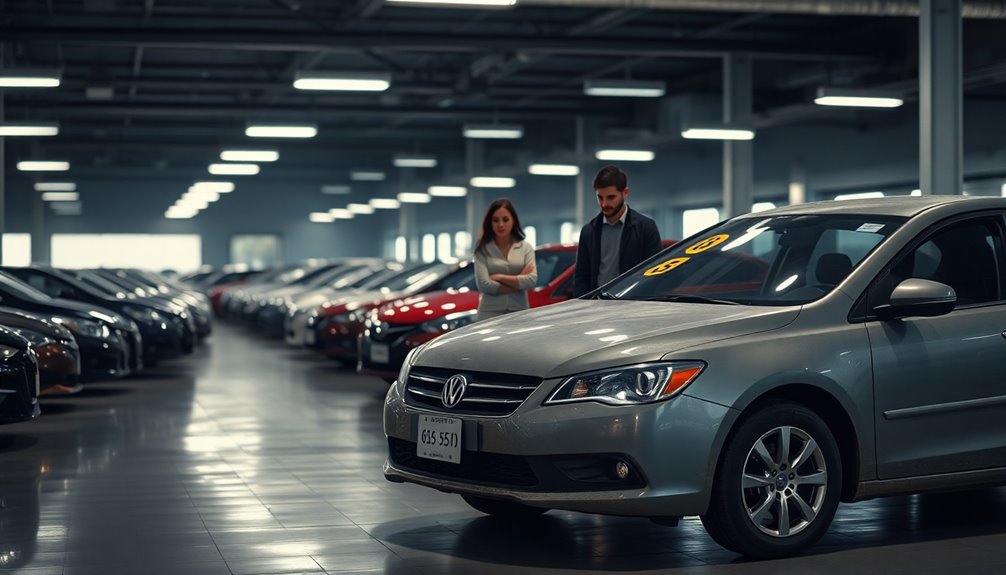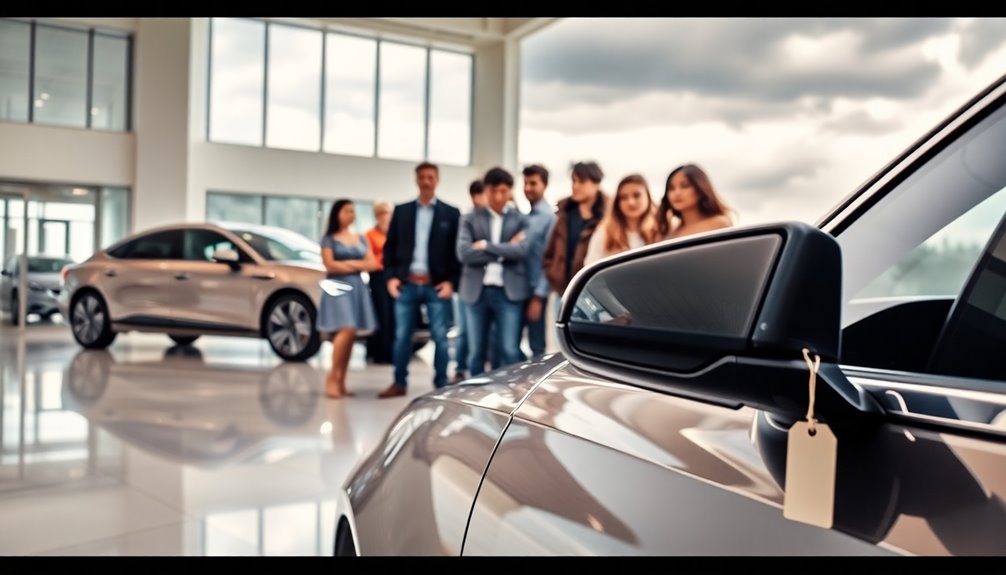Right now, new cars just aren't appealing to many buyers because of their high prices, averaging around $47,000. With rising financing rates and insurance costs, it's no surprise you're considering a used car instead. Used vehicles have become popular, especially models aged 4 to 7 years, which offer significant savings—prices have dropped 10% recently! You're likely looking for something simpler, too, as declining confidence in new tech makes older models with traditional features more attractive. If you want to understand more about how this impacts your choices, there are definitely more insights ahead.
Current Market Trends
The used car market is experiencing a significant shift as consumers grapple with rising prices for new vehicles, which now average around $47,000. With used car prices decreasing by 10% over the past year, you'll find that older models, particularly those 4 to 7 years old, are now even more affordable. This trend aligns with your growing preference for value, as many buyers are dissatisfied with the modern vehicle technology and features found in new cars. Additionally, balancing savings and investments can further support your decision to choose more cost-effective options. Furthermore, many buyers are leveraging price comparison tools to ensure they find the best deals available in the used car market.
Rising insurance premiums and the high average transaction price of new vehicles push you towards used options for better affordability. Furthermore, the average used car loan rate, just over 12%, has also influenced your decision-making, especially with financing costs increasing. As you navigate these market trends, it's clear that older models are gaining appeal, offering reliability and cost-effectiveness. Moreover, utilizing cashback programs during your purchase can further enhance your savings potential in this shifting market.
Economic Factors Driving Choices
When you're weighing the choice between used and new cars, rising new vehicle costs can really impact your budget. Add in increasing insurance premiums and high financing rates, and it's no wonder many people are leaning toward used options. Understanding these economic factors can help you make a smarter decision that fits your financial situation. Additionally, analyzing historical data on car prices and trends can provide valuable insights for making informed purchasing decisions. It's also worth noting that using expense tracking tools can help you monitor your spending and make the most out of your budget during this decision-making process. Furthermore, utilizing apps like Zoho Expense can streamline your financial management by automating expense tracking and providing detailed insights into your spending habits.
Rising New Vehicle Costs
Soaring new vehicle costs are pushing many consumers to reconsider their buying options. With the average transaction price for new vehicles hitting around $47,000, it's no wonder you're feeling the pinch.
Here are three key reasons to think twice about buying new:
- Rising Interest Rates: Financing a new car is becoming pricier, with average loan rates for used cars exceeding 12%.
- Financial Strain: Increased insurance premiums and other costs lead to significant financial strain on households.
- Consumer Confidence: Many buyers are expressing dissatisfaction with new car technology, further impacting their willingness to purchase.
These economic factors are compelling you to explore better value in used cars.
As inflation continues to rise and depreciation concerns linger, opting for used vehicles offers a more budget-friendly alternative.
With shifting consumer confidence in the new car market, it's clear that the allure of shiny new vehicles is fading.
Instead, you might find that used cars not only save you money but also meet your needs without the burdensome costs associated with new cars today.
Increasing Insurance Premiums
Many consumers are feeling the pinch from skyrocketing insurance premiums, which have surged by double digits over the past year. These rising insurance premiums add significant financial burdens, making you rethink your purchasing decisions.
With the average transaction price of new vehicles hovering around $47,000, the combined impact of high insurance costs becomes a major deterrent.
As economic pressures mount, including rising interest rates, more people are turning to used vehicles to alleviate the strain on their wallets. You might find that opting for affordable used cars, especially those priced under $20K, not only helps you avoid hefty new car prices but also keeps insurance costs manageable.
By choosing a used vehicle, you can steer through the complexities of vehicle ownership without the weight of excessive financial commitments.
Ultimately, the current landscape pushes many toward more budget-friendly options. As insurance costs continue to climb, it's clear that a shift towards used vehicles isn't just a trend; it's a smart financial strategy for maneuvering today's challenging economic environment.
You're not alone in seeking alternatives that offer both value and peace of mind amidst rising expenses.
High Financing Rates
With financing rates climbing higher, consumers are feeling the squeeze on their budgets. Here are three key reasons why high financing rates are shifting preferences to used cars:
- Average Interest Rate: The average interest rate for used car loans is over 12%, making financing more expensive than ever.
- Monthly Payments: Nearly half of consumers worry about high financing rates, leading them to seek out used cars to avoid hefty monthly payments.
- Transaction Price: With the average transaction price for new vehicles around $47,000, many find used cars a more financially viable option.
These economic pressures, compounded by rising insurance premiums and inflation, are pushing consumers to reconsider their vehicle choices.
New vehicles often come with larger loan amounts, which only adds to the financial burden. As financing becomes more costly, you'll likely find that opting for a used car not only helps you save money upfront but also eases the strain of monthly payments.
Concerns About New Technologies

Steering through the world of new car technologies can feel overwhelming, especially as consumers grapple with rising concerns about data privacy and the complexity of features in modern vehicles.
You might wonder who's access to your data, particularly with connected cars sharing information with insurance agencies. This distrust can make you hesitant to embrace new models.
Many buyers express frustration with mandatory fuel-saving technologies like stop/start systems and continuously variable transmissions (CVTs), finding them less reliable. Understanding the potential consequences of missed payments can often encourage consumers to be more diligent about their financial decisions, including car purchases. Using budget apps can help streamline your financial planning, making it easier to manage significant expenditures like a new car.
The influx of advanced driver-assist systems (ADAS) may seem appealing, but the perceived intrusive nature of these features often leads to consumer dissatisfaction. You may long for a simpler driving experience, free from distractions.
Moreover, the shift to touch screens and capacitive switches can feel jarring. If you prefer physical controls, maneuvering through virtual menus can be frustrating and less user-friendly. Implementing a centralized system for tracking your financial obligations can help you feel more in control, even when making significant purchases.
This complexity can diminish your emotional connection with your vehicle, as new technologies shift focus away from driving pleasure. Additionally, many consumers are now prioritizing sustainable delivery practices, which often leads them to consider more environmentally friendly options like used cars.
With usability concerns growing, it's no wonder many are leaning toward used cars, which often offer a more straightforward, familiar driving experience.
Desire for Traditional Features
You might find yourself longing for the simpler designs and manual controls that many older vehicles offer.
As modern cars become packed with complicated features, the charm of traditional elements like manual transmissions can be hard to resist. This nostalgia often drives buyers to seek out used cars that provide a more straightforward driving experience. Additionally, the shift towards sustainable practices in various industries encourages consumers to make choices that reduce their environmental impact, influencing their decisions in the automotive market. By choosing used cars, buyers are also supporting a circular economy that encourages reusing and recycling resources. Furthermore, opting for used vehicles aligns with sustainable consumption principles that help combat global warming and promote responsible resource use.
Nostalgia for Simpler Designs
Nostalgia plays a powerful role in the automotive market, as many drivers crave the simplicity of traditional vehicle features like manual transmissions and built-in CD players. This yearning for simpler designs reflects a broader trend of emotional attachment to older cars, where buyers find comfort in reliability and familiarity.
Here are three reasons why you might feel drawn to these classic models:
- Character: Older cars often boast unique designs that stand out from today's uniformity.
- Engagement: The analog driving experiences they offer are more satisfying compared to the complex technology in new vehicles.
- Simplicity: Traditional vehicle features eliminate the distractions that come with modern gadgets, providing a more straightforward driving experience.
As dissatisfaction with modern aesthetic changes grows, the preference for classic designs continues to shape purchasing decisions.
Many drivers appreciate the charm of manual transmissions over automatic options, longing for a time when cars felt more personal.
In a world increasingly filled with intrusive technology, you might find solace in the simpler designs of the past, fostering a sense of nostalgia that guides your automotive choices.
Preference for Manual Controls
As technology continues to advance, many drivers find themselves longing for the tactile experience of manual controls in their vehicles. You may share a strong preference for manual controls and traditional features, such as gear shifters and built-in CD players, which are increasingly rare in new models.
The frustration with touch screens and capacitive switches is palpable; you appreciate the simplicity and reliability of physical controls that older models provide.
This cultural shift towards valuing simplicity in vehicle design reflects your desire for more straightforward, no-nonsense driving experiences. Older vehicles often evoke nostalgia, reminding you of a time when driving felt more connected and engaging.
Many consumers, like yourself, feel that new cars lack the emotional connection and excitement that comes from a manual transmission or classic features.
As a result, you may find yourself drawn to used vehicles that embody these qualities. They not only offer the reliability and simplicity you crave but also connect you to the past in a way modern cars simply can't.
Embracing the preference for manual controls means choosing a vehicle that resonates with your values and driving desires.
Consumer Sentiment on New Cars

Many consumers are feeling disenchanted with new cars, primarily due to soaring average transaction prices that now hover around $47,000. This sentiment is fueled by several factors:
- Rising Prices: New car prices are climbing, making them less accessible for many buyers.
- Complex Technology: Many drivers find the advanced technology in new vehicles overwhelming and unnecessary.
- Nostalgia for Simplicity: Consumers yearn for the simplicity of older models, like those with manual transmissions and built-in CD players.
As a result, consumer sentiment is shifting towards used cars. The benefits of savings goal setting can also encourage buyers to consider more cost-effective options. Additionally, utilizing price comparison tools can help consumers find the best deals on used vehicles.
You're likely noticing that more people are opting for nearly new vehicles, which offer significant savings without the steep depreciation associated with new models.
The increasing insurance premiums and financing costs only add to the appeal of used cars.
Additionally, there's a growing resistance to mandatory features, like stop/start systems and CVTs, which many drivers find intrusive.
This dissatisfaction, combined with a nostalgic longing for traditional vehicle features, is steering you and others towards the reliability and familiarity of used cars.
Ultimately, the market is reflecting a clear trend: new cars just aren't capturing interest like they used to. Furthermore, consumers are increasingly recognizing the benefits of automated savings as a means to enhance their financial stability while purchasing vehicles.
Pricing Dynamics of Used Cars
In today's market, the pricing dynamics of used cars are shifting, offering more options for budget-conscious buyers. The average price of used cars has dropped to $25,499 in November 2024, reflecting a 10% decrease over the last year. This change enhances affordability, especially for those looking for 4- to 7-year-old vehicles, which have seen a 19% reduction in price, and 8- to 13-year-old cars, down 18%.
However, despite these decreases, prices remain higher than pre-pandemic levels, indicating ongoing affordability challenges. Additionally, interest rates for used car loans hover just over 12%, contributing to increased financing costs that can impact your overall budget.
The scarcity of older used cars priced under $15,000 makes things even trickier. Consumer demand often exceeds supply due to pandemic-related production issues, so finding a budget-friendly option might require more effort.
As you navigate these pricing dynamics, consider the implications of depreciation, which can offer significant savings over time. Overall, while the landscape is improving, it's crucial to remain aware of the factors influencing used car pricing today.
Financing Challenges and Strategies

Maneuvering the financing landscape for used cars can be challenging, especially with average loan rates exceeding 12%. This reality increases the financial burden on buyers, making it vital to approach financing strategically.
Here are three key strategies to take into account:
- Prearrange Financing: Don't rely solely on dealership offers. Look into banks or credit unions to secure better loan rates, especially if you have strong credit ratings.
- Compare Interest Rates: With rising interest rates, the financing costs for used cars can add up. Shop around and compare offers to find the most budget-friendly options available.
- Evaluate Purchase Prices: Even though used cars are generally cheaper, the higher financing costs can make them less affordable. Be mindful of how rising loan rates affect your total expenditure.
As a consumer, it's important to stay informed about the current market and your own financial situation.
Long-Term Ownership Considerations
Long-term ownership of older cars has become increasingly appealing to consumers, with many finding that these vehicles offer significant economic benefits.
With the average transaction price of new vehicles soaring to about $47,000, investing in used cars is a financially appealing alternative. You can enjoy manageable maintenance costs while avoiding hefty monthly payments, making budgeting easier.
Many owners of ten-year-old sedans and pickups report high satisfaction rates, proving that older cars can deliver reliable service over time. The emotional attachment that develops during long-term ownership is another perk, as many drivers feel nostalgia for the simpler features and character of these vehicles.
Plus, with rising interest rates averaging over 12% for new car financing, the savings associated with used cars become even more pronounced. By opting for older models that are often paid off, you can sidestep the additional stress of financing altogether.
Ultimately, choosing long-term ownership of older cars not only enhances your financial health but also allows you to forge deeper connections with your vehicle, enriching your driving experience.
Conclusion
So, while everyone's dreaming about that shiny new car, you're smartly eyeing those reliable used models. Who needs the latest tech when you can save a bundle and enjoy that classic feel? It's almost ironic how the quest for innovation leads folks right back to good old-fashioned value. In the end, you're not just saving money; you're making a statement. After all, why pay more for new when the best deals are just a few miles down the road?



